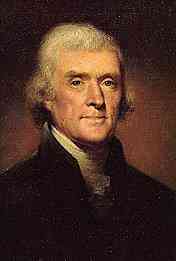|
|

To C. F. de C. Volney Washington, Feb. 11, 1806
DEAR SIR, -- Since mine of Feb. 18 of the last year, I have
received yours of July 2. I have been constantly looking out for an
opportunity of sending your Polygraph; but the blockade of Havre has
cut off that resource, and I have feared to send it to a port from
which there would be only land carriage. A safe conveyance now
offering to Nantes, & under the particular care of Mr. Skipwith, who
is returning to France, he will take care of it from Nantes by land
if an easy carriage is found, or if not, then by the canal of Briare.
Another year's constant use of a similar one attaches me more and
more to it as a most valuable convenience. I send you also a
pamphlet published here against the English doctrine which denies to
neutrals a trade in war not open to them in peace in which you will
find it pulverized by a logic not to be controverted.
Our last news of Captn Lewis was that he had reached the upper
part of the Missouri, & had taken horses to cross the Highlands to
the Columbia river. He passed the last winter among the Manians 1610
miles above the mouth of the river. So far he had delineated it with
as great accuracy as will probably be ever applied to it, as his
courses & distances by mensuration were corrected by almost daily
observations of latitude and longitude. With his map he sent us
specimens or information of the following animals not before known to
the northern continent of America.
- The horns of what is perhaps a
species of Ovis Ammon.
- A new variety of the deer having a black
tail.
- An antelope.
- The badger, not before known out of
Europe.
- A new species of marmotte.
- A white weasel.
- The magpie.
- The Prairie hen, said to resemble the Guinea hen
(peintade).
- A prickly lizard.
To these are added a considerable
collection of minerals, not yet analyzed. He wintered in Lat. 47
degrees 20' and found the maximum of cold 43 degrees below the zero
of Fahrenheit. We expect he has reached the Pacific, and is now
wintering on the head of the Missouri, and will be here next autumn.
Having been disappointed in our view of sending an exploring party up
the Red river the last year, they were sent up the Washita, as far as
the hot springs, under the direction of Mr. Dunbar. He found the
temperature of the springs 150 degrees of Fahrenheit & the water
perfectly potable when cooled. We obtain also the geography of that
river, so far with perfect accuracy. Our party is just at this time
setting out from Natchez to ascend the Red river. These expeditions
are so laborious, & hazardous, that men of science, used to the
temperature & inactivity of their closet, cannot be induced to
undertake them. They are headed therefore by persons qualified
expressly to give us the geography of the rivers with perfect
accuracy, and of good common knolege and observation in the animal,
vegetable & mineral departments. When the route shall be once open
and known, scientific men will undertake, & verify & class it's
subjects. Our emigration to the western country from these states
the last year is estimated at about 100,000. I conjecture that about
one-half the number of our increase will emigrate westwardly
annually. A newspaper paragraph tells me, with some details, that
the society of agriculture of Paris had thought a mould-board of my
construction worthy their notice & Mr. Dupont confirms it in a
letter, but not specifying anything particular. I send him a model
with an advantageous change in the form, in which however the
principle is rigorously the same. I mention this to you lest he
should have left France for America, and I notice it no otherwise
lest there should have been any error in the information.
Present my
respectful salutations to Doctr. Cabanis & accept them yourself with
assurances of my constant friendship & attachment.

|

